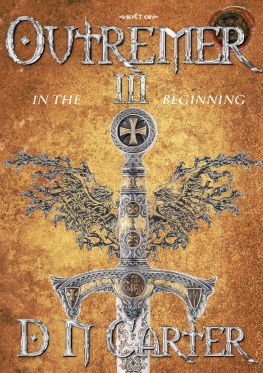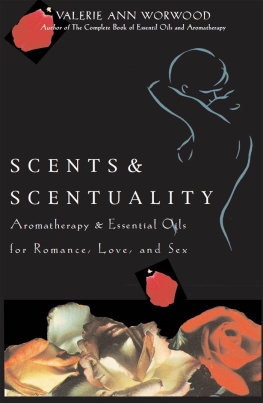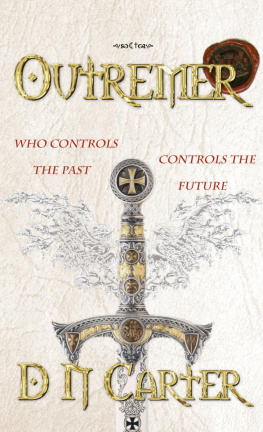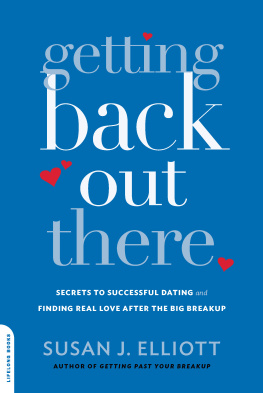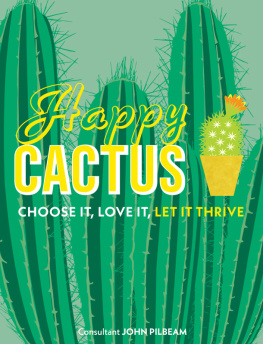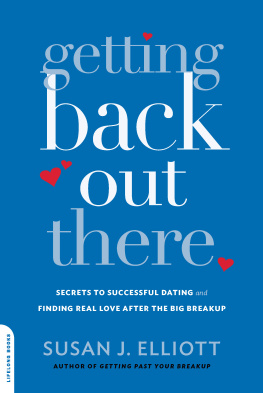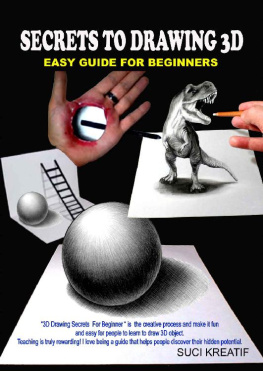THIS
IS HOW
LOVE
WORKS
THIS
IS HOW
LOVE
WORKS
9 Essential Secrets You
Need to Know
Steven Carter

Copyright 2001 by Steven Carter
All rights reserved. No portion of this book may be reproduced or transmitted in any form or by any means without the written permission of the publisher.
M. Evans and Company, Inc.
216 East 49th Street
New York, New York 10017
Library of Congress Cataloging-in-Publication Data
Carter, Steven, 1956
This is how love works : 9 essential secrets you need to know / by Steven Carter.
p. cm.
ISBN: 978-0-87131-994-4
1. Love. 2. Interpersonal relations. 3. Intimacy (Psychology). I. Title.
HQ801 .C295 2001
306.7dc21
00-060001
Printed in the United States of America
9 8 7 6 5 4 3 2 1
CONTENTS
for Maggie, in loving memory
ACKNOWLEDGMENTS
A lot of people have helped make this book possible, and I need to give them all my thanks here.
First, my most special thanks to Julia Sokol for generously donating her time and energy to review this material and offer countless ideas, many of which helped shape this book.
My most sincere thanks to George de Kay for supporting this book, to PJ Dempsey for her valuable editorial input, to Rik Lain Schell for his hard work and extraodinary patience, and to the rest of the staff at M. Evans, who are always such a pleasure to work with.
My thanks to my agent, Barbara Lowenstein, and her staff for helping this book find a happy home. Thanks to Peter Coopersmith and the staff at Quidnunc Productions for the website design at www.HowLoveWorks.com . Thanks also to Jackie Cantor, Irene Harwood, Frederick Friedel, Ken Sherman, Lloyd Johnson, Norman Haggie, Sonja Eisenberg, Carla Carter, and Susan Hauptman. And a very special thanks to Leonard Post.
So many thanks to the men and women who were willing to share their personal stories in this book so that other couples might benefit.
I need to express my incredible gratitude to all of the authors who have encouraged my work in the recent years, especially Warren Farrell, Iyanla Vanzant, Susan Forward, Howard Halpern, Gwendolyn Goldsby Grant, Linda Stasi, Laura Zigman, Lillian Glass, Ellen Kriedman, and Asa Baber.
Finally, I give my love and thanks to my wife Jill. Without her belief in love and partnership, this book would not have been possible.
INTRODUCTION
I have written this book because I believe in partnership and in the possibility of long-term loving connection. These are not a given in any relationship; they have to be created and maintained with loving awareness, commitment, and constant work. But they have been the greatest gifts to enter into my life in the last five yearsthe ultimate reward for being completely committed to another human being. In this book I would like to help you experience that same reward.
WHEN PARTNERSHIP WORKS,
IT IS NOT AN ACCIDENT
Everyone tells us that it takes a lot of work to build a lasting relationship. Rarely, however, do they give us any specifics or concrete information about what that means. When we fall in love, were filled with enthusiasm; we hope, and trust, that everything is going to work out. What we typically do is rely on the strength of the love and the initial attractionnot the workto see us through. We want to believe that love, combined with healthy instincts and good intentions, will steer us in the right direction. And when we get into trouble, we expect love to rescue us. But lets face it, if love was all that was required, many more relationships would make it.
Through no fault of our own, most of us have not been appropriately trained or conditioned for partnership. It is a sign of the times. Simply put, we havent had enough practice. Whether we have adored dating and living a single life or loathed every bit of the process, as men and women forming relationships today we have far more skills for being single than we do for being part of a couple.
Sometimes we have mastered these single-life skills because we had little choice; we were waiting for a love that was slow in coming. Yet ironically these perfected skills are often at the root of our partnership problems. We are too good at being single. We know how to make our own decisions. We know how to make our own plans. We know how to fill in the spaces. We live alone longer and longer, and marry later and later, never imagining that this might make us less prepared for serious relationships. In fact, we often believe this will make us more ready because we feel healthier and stronger and more self-possessed. But, in truth, we have spent little time honing our partnership skills. This is something we quickly discover when that special person we have hoped for does come along, and we find ourselves suddenly struggling with the day-to-day issues of making a relationship successful and happy.
PARTNERSHIP SKILLS
ARE LEARNED SKILLS
We all know what it means to fall in love. We know what it feels like to have our spirits lifted by the sense of promise and hope that arises when we meet someone we can genuinely care about. We know how exciting it can be to envision the possibility of a future partnership of two sincere and loving hearts. And we know what it means to invest our belief and hope in that possibility. Yet every single person who wants a loving partnership is wrestling with the unpleasant fact that dreams about love are not always fulfilled. Everyone has gone out on a first date, full of expectation, only to sit across a table from a stranger wondering, What was I thinking? Many potential relationships collapse after one or two dates because the initial attraction was simply not enough to carry the couple any further. Some couples manage to stay together for several months, but then the initial attraction wears off, and nothing has arrived to replace it. Some couples are together for several years before the glue fails to hold. Many couples get married, and many even stay marriedyet how many of these marriages are truly loving and truly gratifying?
Anyone who believes in love, as indeed I do, has to ask the following questions: What can I do to ensure the success of my relationship? What can I do each day to make my relationship more loving and fulfilling? How can I make sure that my partner and I will continue to connect and grow together?
In the twenty years I have been studying, observing, and writing about romantic relationships, I am constantly surprised by the number of people who tell me that even though they think they have found the partner of their dreams, they are failing to create the relationship they expected. These men and women insist they have all the basics: love, real chemistry, good intentions, shared interests, shared values, shared goals, and a willingness to work on the relationship. Many are quick to point out that they have great sex. And I believe all of their claims. Regardless of what they do have, however, they do not feel satisfied. The relationship isnt taking care of their needs. Something is wrong, but they dont know what that something is.
Yet some relationships do thrive. The partners start off loving and hopeful, and they continue that way. Strong, healthy, resilient bonds develop; the relationship grows and flourishes; and both partners feel satisfied and connected. What do the women and men in these relationships know? What do they do that is different? What keeps these connections so vital?
Next page




